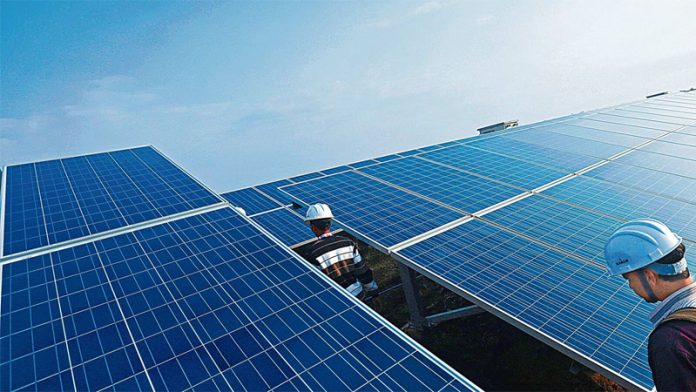- Against target of 50,000 buildings, less than 2000 covered
- Authorities need to generate awareness at large scale
Mohinder Verma
JAMMU, Apr 29: Though the deadline fixed by the Government of Union Territory of Jammu and Kashmir is over yet there is no major headway on Rooftop Solar Scheme for Jammu city as against the target of 50,000 residential buildings less than 2000 have been covered till date. This is mainly for want of sustained campaign to generate awareness among the people about the benefits of the scheme.
The Jammu and Kashmir Administrative Council vide its Decision No.77/6/2022 dated June 8, 2022 approved the installation of 200 Mega Watts of grid-tied rooftop solar power plants under the “Solar City Mission” in Jammu.
Click Here To Follow Our WhatsApp Channel
The decision was taken to implement the Government of India’s grid-connected Rooftop Solar Scheme Phase-II for the residential sector to ensure that the electricity needs of the city are fully met from solar energy.
It was officially announced that under the project, 200 MW grid-tied rooftop solar power plants will be installed on 50,000 residential buildings in Jammu city by the Jammu and Kashmir Energy Development Agency (JAKEDA) under its “Solar City Mission” at an estimated cost of Rs 1040 crore and the project will be completed by March 2024 and it will have a lifetime of 25 years.
Thereafter, the Science and Technology Department vide Government Order No.20-JK(ST) dated July 1, 2022 accorded sanction for the installation of 200 MW grid-tied rooftop solar power plants on a minimum of 50,000 residential buildings in Jammu city and laid down certain conditions for the vendors. After following the due procedure, the JAKEDA finalized some vendors for installation of plants.
“However, there is no major headway although the deadline fixed by the Administrative Council is over. Against target of 50,000 residential buildings only 1700 have been covered till date by JAKEDA through the empanelled companies”, official sources told EXCELSIOR, “this is mainly because large number of people of Jammu city are still unaware of the benefits of the grid-connected rooftop solar plants”.
Had sustained campaign been carried out to generate awareness in every nook and corner of Jammu city progress could have been much more, sources further said, adding “because of negligible progress in the implementation of the scheme the objectives of reducing carbon emissions and reaping gains from savings on account of inter-state transmission losses could not be achieved”.
Likewise, because of no major headway even enough employment opportunities could not be generated although it was announced at the time of approval of the scheme that one Mega Watt rooftop solar PV project will generate a total of 40 full-time equivalent jobs over next 25 years, which includes highly skilled personnel for business development, design, sales, procurement and project management; one-time jobs for construction and installation of the rooftop PV system and unskilled resources for cleaning activity of the plant, sources further said.
Further, it was claimed that a number of additional job will also be created in secondary and tertiary roles vis-à-vis manufacturing and supply of system equipment such as inverters, cables, trackers and other parts as such around 8000 jobs will be generated through the project.
When contacted, a senior officer of Jammu and Kashmir Energy Development Agency (JAKEDA) confirmed that no major progress could be achieved till date and attributed the same to reluctance of the people to come forward. “We conducted several events for awareness purpose but still response of the people is not up to our expectations”, he added.
He informed that Rooftop Solar Programme will provide subsidized installation of solar power panels on residential houses at the cost of Rs 58,739, Rs 53,995, Rs 52,594 and Rs 51,309 for Category-A (Up to 1 kW), Category-B (> 1 kW to 2 kW), Category-C (> 2kW up to 3 kW) and Category-D (> 3 kW up to 10 kW), respectively.
“The Central Sector Scheme provides a subsidy component of 40% of the project cost and a State subsidy component of 25% of the project cost for the installation of solar power panels, below 3 kW capacity, beyond which the Central subsidy component remains at 20%. The subsidy will be provided to the beneficiaries through the DBT mode”, he said.
The officer further informed that these rooftop solar power plants will be connected to the grid on a net metering basis and the investments made by the beneficiaries will be recovered at a rate of 25% annually on account of the saving of energy with a payback period of approximately 4 years. He appealed to the people of Jammu city to come forward and avail the benefit of the scheme.


